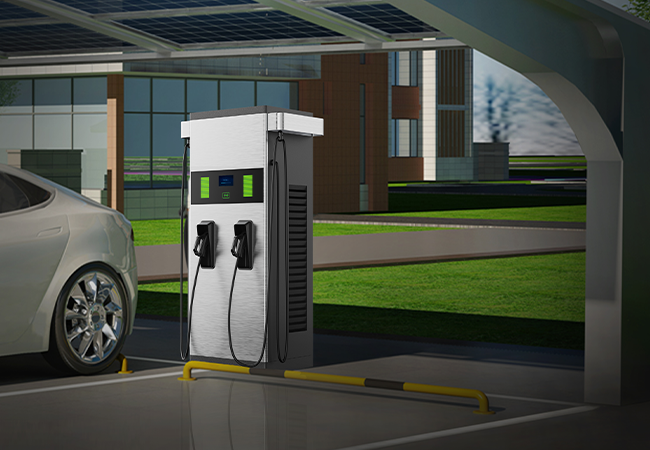As urbanization continues to accelerate and environmental issues become more prominent, the sustainability of public transport systems has become a key issue in urban planning and development. The rapid development of electric vehicle technology has injected new vitality into public transport, with electric buses attracting attention as an environmentally friendly, economical, and efficient means of transport. However, the widespread application of electric buses still faces a series of challenges such as insufficient charging infrastructure, slow charging speed, and inflexible charging management. In this paper, we will explore how to improve the sustainability and efficiency of urban public transport systems by improving electric vehicle charging solutions.
Advantages of electric buses
Electric buses are a type of public transport that uses electricity as a power source. Compared to traditional internal combustion engine buses, electric buses have significant environmental advantages. Firstly, the zero-emission nature of electric buses reduces air pollution and greenhouse gas emissions, helping to improve urban air quality and combat climate change.
In addition, the use of electric buses can reduce operating costs. While electric vehicles may have a higher acquisition cost, they typically have lower fuel costs and maintenance costs in long-term operation. This makes electric buses more economical in the long run and helps reduce the overall operating costs of urban public transport systems.
In addition to the economic and environmental advantages, electric buses also reduce noise pollution. While the noise generated by traditional internal combustion engine vehicles has an impact on city residents and the environment, electric buses are usually quieter and can mitigate noise pollution problems in cities.
How electric vehicle charging solutions can improve public transport?
Increase charging infrastructure:
In order to promote the wider use of electric buses, cities need to build more EV charging stations, especially in public transport hubs, main city roads, and areas with heavy traffic. Such a network of charging stations will make it easier for electric buses to access charging services and reduce the inconvenience of charging during operation. When selecting the locations of charging stations, the needs of public transport routes should be taken into account to ensure that the layout of the charging stations is in line with actual operation.
EV charger producers offer diverse charging infrastructures for electric buses, including DC fast charging, supercharging stations, and more. In this way, the charging needs of electric buses can be better met with the right charging service for different situations.
Improve the charging speed of electric vehicle chargers:
The improvement of charging speed is crucial for the operational efficiency of electric buses. Electric vehicle charger wholesalers use fast charging technology to provide a fast charging solution for electric buses. This innovative EV charging solution reduces the charging time of electric buses, allowing them to return to operation faster. Time is a critical resource in public transport systems, and fast charging technology can minimize the stopping time of electric buses and improve overall operational efficiency.
As EV charging technology continues to advance, higher-speed charging equipment such as supercharging stations are emerging. The application of these technologies will further promote the popularity of electric buses and provide cities with more efficient public transport services.
Intelligent Charging Management System:
The adoption of intelligent charging management systems is a key measure to improve the charging efficiency of electric buses. By monitoring the charging demand of electric vehicles in real-time and predicting peak hours, the system can manage the use of electric vehicle charging piles more flexibly. This avoids congestion at charging stations, optimizes the efficiency of charging pile usage, and ensures that electric buses can quickly find available charging equipment when they need to be charged.
Intelligent charging management systems are also able to improve the reliability and stability of charging infrastructure by enabling remote monitoring and troubleshooting through network connectivity. This helps to reduce maintenance costs and ensure stable operation of charging equipment over long periods of time.
Promote distributed charging:
In order to improve the balanced distribution of charging facilities, distributed charging needs to be promoted in different areas of the city. This avoids the concentration of charging stations in specific areas and reduces traffic congestion and waste of resources due to over-concentration of charging stations. Widespread deployment of distributed charging facilities will also help to meet the charging demand in different areas of the city, making it more convenient for electric buses to be charged.
By promoting distributed charging, a complete charging network can be established throughout the city, providing a wider range of charging options for electric buses. This is crucial for the sustainable development of public transport systems and the promotion of electric buses.
Conclusion
Measures such as improving EV charging infrastructure, upgrading charging speeds, adopting smart charging management systems, promoting distributed charging, and developing electric buses are effective ways to promote better performance of electric buses in public transport systems. These measures will help improve the availability, operational efficiency, and cost-effectiveness of electric buses while reducing the negative impact on the environment. Through rational planning and the application of innovative technologies, we can build a smarter, more convenient, and greener public transport system, provide urban residents with a more comfortable and environmentally friendly traveling experience, and push forward the goal of sustainable urban development.
Read Dive is a leading technology blog focusing on different domains like Blockchain, AI, Chatbot, Fintech, Health Tech, Software Development and Testing. For guest blogging, please feel free to contact at readdive@gmail.com.





